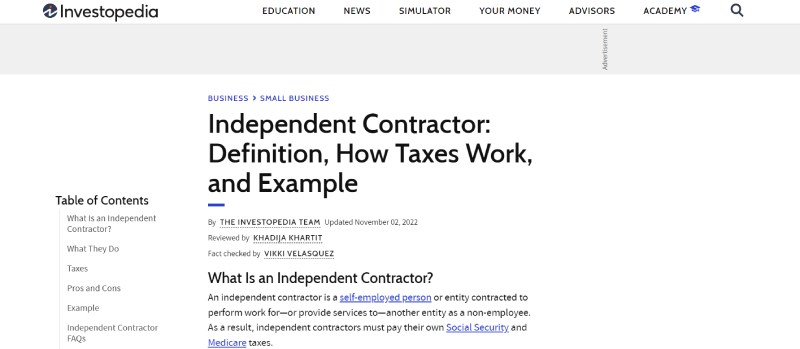Because of technological improvements, telecommuters are a new category of employees that can work remotely. They are generally young, unmarried, and have little attachment to any particular location. As a result, they are ideal candidates for tax dodging.
Although there are certainly justifiable reasons for telecommuters to evade taxation, like working in states with lower taxation, the truth is that most of them are just intent on avoiding paying his/her fair share.
This is unjust to the remainder of the people who pay taxes, and it strains government funds. So do not be a tax dodger, or the government will become the monster that haunts you at night.
Table of Contents
- Do Digital Nomads also pay taxes:
- Where do digital nomads pay their taxes?
- How to tax your own Digital Nomads:
- Discounts or Credits for Foreign Taxes:
- Queries about Digital Nomad Taxes:
- Don’t be a tax dodger:
Do Digital Nomads also pay taxes:
Are you a digital nomad? If so, you’re probably well aware of the many benefits that come with this lifestyle. One of the biggest benefits is the fact that you can work from anywhere in the world.


However, there are also some challenges that come with being a digital nomad. One of the biggest challenges is dealing with taxes. As a digital nomad, you are considered a resident of the country where you live and work.
This means that you are subject to that country’s tax laws. This can be a challenge because you may not be familiar with the tax laws of the country where you live and work.
Additionally, the tax laws of different countries can be very different. One way to deal with this challenge is to hire a tax professional who is familiar with the tax laws of the countries where you live and work.
Another way to deal with this challenge is to research the tax laws of the countries where you live and work. This can be time-consuming, but it is worth it to make sure that you are complying with the tax laws.
Digital nomads often have to pay taxes in multiple countries. This can be a challenge, but there are ways to minimize the amount of taxes.
As a digital nomad, you are considered an independent contractor and are responsible for your own taxes. This can be a bit of a daunting task, but there are a few things you can do to make sure you stay on top of your tax obligations.
First, make sure you keep good records of your income and expenses. This will make it much easier to file your taxes each year. You can use a simple spreadsheet or accounting software to track this information.

Second, take advantage of any tax deductions and credits that you may be eligible for.
For example, if you work from home, you may be able to deduct a portion of your rent or mortgage interest.
Finally, make sure you set aside money each month to pay your taxes. This will help you avoid any penalties or interest charges.
Where do digital nomads pay their taxes?
There is no one answer to this question as digital nomads may be based in any number of countries and therefore may be subject to different tax regimes.
However, many digital nomads choose to base themselves in countries with favourable tax regimes for self-employed individuals, such as Thailand, Malaysia, and the United Arab Emirates.
In general, digital nomads should ensure that they are up to date with the tax requirements of the countries in which they are based and file their taxes in a timely manner.
How to tax your own Digital Nomads:
The first step is to ensure that your digital nomads are correctly classified as independent contractors. You will then need to withhold taxes on their behalf and make sure that their tax returns are filed correctly.

It is essential to know the territory in which the job is being conducted, as well as the applicable legislation.
If a corporation recruits a digital nomad who operates from another nation, or even in a foreign state or area, the tax requirements may change.
Make sure you comprehend what taxes must be deducted from your remote employees’ pay in order for your foreign cost accounting to be correct and completely legal.
Tax forms required in various countries:
Firms that recruit digital freelancers should be mindful of the papers that their workers will be required to complete in order to stay legal.
The amount of paperwork required may vary based on the jurisdiction, so do your homework before digging in and handling the payroll with your remote workers.
The tax forms required in various countries vary depending on the country’s tax laws. However, some of the most common tax forms required in different countries include the following:
- In the United States, the most common tax form required is the 1040 form.
- In the United Kingdom, the most common tax form required is the Self Assessment tax return form.
- In Canada, the most common tax form required is the T1 General tax return form.
- In Australia, the most common tax form required is the Individual tax return form.
Discounts or Credits for Foreign Taxes:
If you paid taxes to a foreign government on foreign income, you may be eligible to take a foreign tax credit on your U.S. tax return. This will reduce your overall tax liability.
Nontaxable foreign income:
Certain types of income may be exempt from U.S. taxes. These include interest on foreign government bonds and some types of foreign pensions.

U.S. possessions:
If you reside in or earn income from a U.S. possession, you may be eligible for special tax benefits.
Foreign earned income exclusion:
If you are a U.S. citizen or resident alien who lives and works abroad, you may be eligible to exclude from your income a certain amount of your foreign earnings.
To qualify, your tax home must be in a foreign country, and you must meet either the bona fide residence test or the physical presence test.
Foreign housing exclusion or deduction:
If you qualify for the foreign-earned income exclusion, you may also be able to exclude or deduct your foreign housing amount. This is the housing amount that you paid for with your excluded foreign-earned income.
Foreign tax credit:
If you paid taxes to a foreign government on foreign-earned income, you may be able to take a foreign tax credit. The credit will reduce your overall tax liability.
Queries about Digital Nomad Taxes:
Taxation for international travellers may be complicated. In this section, we tackle certain extra tax issues to aid you in being lawful while supervising your digital nomads.
What is the digital nomad tax rate?
There is no set digital nomad tax rate. The rate will depend on the country in which the digital nomad is a tax resident.
Do digital nomads have to pay taxes?
Yes, digital nomads are subject to taxation in the same way as any other individual with income earned in a country.
What is the best country for digital nomads?
There is no easy answer to this question as it depends on the individual circumstances of the digital nomad. Some factors to consider include the cost of living, the availability of work, the tax regime, and the quality of life.
Physical presence test:
The physical presence test is one of the requirements that a person must meet in order to be considered a resident alien for tax purposes.
A person must be physically present in the United States for at least 31 days during the current tax year and must have a total of at least 183 days of physical presence during the 3-year period that includes the current tax year and the 2 years immediately before that.
What Tax Deductions Are There for Digital Nomads?
There are a few tax exemptions available for digital nomads. One is the Foreign Earned Income Exclusion, which allows you to exclude up to $102,100 of income from taxes if you meet certain requirements.
Another is the Foreign Tax Credit, which allows you to offset taxes you’ve paid to another country against your US taxes.
Don’t be a tax dodger:
Paying taxes as a digital nomad can be a complicated and confusing process. There are a few different ways to go about it, and the best option for you will depend on your individual situation.
The most important thing is to stay organised and keep good records. If you have any questions, be sure to seek out the advice of a tax professional.
They can help you figure out the best way to file your taxes and make sure you are compliant with all the rules and regulations so you all can also have a fun and safe journey, being a digital nomad.

